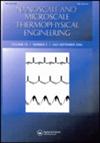Effects of Surface Wettability on Rapid Boiling and Bubble Nucleation: A Molecular Dynamics Study
IF 2.7
3区 工程技术
Q2 ENGINEERING, MECHANICAL
Nanoscale and Microscale Thermophysical Engineering
Pub Date : 2018-07-03
DOI:10.1080/15567265.2018.1475526
引用次数: 25
Abstract
ABSTRACT Molecular dynamics simulation is conducted to study the effects of surface wettability on rapid boiling and bubble nucleation over smooth surface. The simple L-J liquid is heated by smooth metal surface with different conditions of wettability in cuboid simulation box. The results show that surface wettability has significant impact on phase transition of liquid film. When the heating temperature is 200 K, the rapid boiling occurs above strongly hydrophilic and weakly hydrophilic surfaces; however, only slow evaporation phenomenon occurs above weakly hydrophobic surface within 2.5-ns simulation time. The reason is that the interaction between argon and platinum atoms is stronger over hydrophilic surface, which has higher efficiency in heat transfer. Furthermore, based on the difference of surface wettability in heat transfer efficiency, the surface with nonuniform wettability is constructed, and the central region is more hydrophilic than surrounding region. The growing process of bubble nucleus can be completely observed above the more hydrophilic region.表面润湿性对快速沸腾和气泡成核的影响:分子动力学研究
通过分子动力学模拟研究了表面润湿性对光滑表面快速沸腾和气泡成核的影响。在长方体模拟箱中,用不同润湿性条件的光滑金属表面加热简单L-J液体。结果表明,表面润湿性对液膜的相变有显著影响。当加热温度为200 K时,强亲水性和弱亲水性表面均发生快速沸腾;而在2.5 ns的模拟时间内,弱疏水表面只出现缓慢的蒸发现象。这是因为在亲水表面上,氩与铂原子之间的相互作用更强,传热效率更高。进一步,基于表面润湿性在换热效率上的差异,构建了润湿性不均匀的表面,中心区域比周围区域更亲水。在较亲水的区域以上,可以完全观察到气泡核的生长过程。
本文章由计算机程序翻译,如有差异,请以英文原文为准。
求助全文
约1分钟内获得全文
求助全文
来源期刊

Nanoscale and Microscale Thermophysical Engineering
工程技术-材料科学:表征与测试
CiteScore
5.90
自引率
2.40%
发文量
12
审稿时长
3.3 months
期刊介绍:
Nanoscale and Microscale Thermophysical Engineering is a journal covering the basic science and engineering of nanoscale and microscale energy and mass transport, conversion, and storage processes. In addition, the journal addresses the uses of these principles for device and system applications in the fields of energy, environment, information, medicine, and transportation.
The journal publishes both original research articles and reviews of historical accounts, latest progresses, and future directions in this rapidly advancing field. Papers deal with such topics as:
transport and interactions of electrons, phonons, photons, and spins in solids,
interfacial energy transport and phase change processes,
microscale and nanoscale fluid and mass transport and chemical reaction,
molecular-level energy transport, storage, conversion, reaction, and phase transition,
near field thermal radiation and plasmonic effects,
ultrafast and high spatial resolution measurements,
multi length and time scale modeling and computations,
processing of nanostructured materials, including composites,
micro and nanoscale manufacturing,
energy conversion and storage devices and systems,
thermal management devices and systems,
microfluidic and nanofluidic devices and systems,
molecular analysis devices and systems.
 求助内容:
求助内容: 应助结果提醒方式:
应助结果提醒方式:


